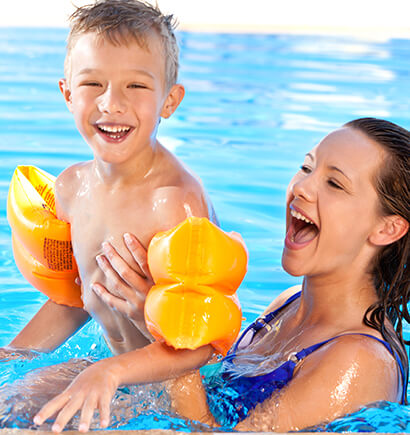Testing the waters in your swimming pool on a regular basis is essential. Even though it may look clean, the water may be out of balance. This is not something you easily notice.
As such, it is recommended that you test the pool water at least once a week in your home using a test kit or test strips. Given below are some of the reasons why you should ensure that the water balance is properly maintained.
Bather Comfort and Health
When the pH balance of the pool water is disrupted, it can become too acidic or alkaline (basic), both of which are not good for swimmers (preferable). Such water can cause skin irritations and make your eyes feel like they are burning. Plus, certain germs like bacteria and viruses thrive in low pH water. This can eventually cause serious health issues.
The best pH value for a swimming pool is within a range of 7.2 to 7.6. At this level, the pool is safe to swim and the water is less irritant. This means no stinging eyes, itchy skin or major microbial infections.
Use Less Chemicals
Without proper water balance, you will have to use more chlorine and other chemicals to treat it. For example, by maintaining the pH level to around 7.2, you can get chlorine to be 10 times more effective. As such, you will need a lesser amount of chlorine and can save money at the same time.
If you need to lower high pH water in order to make chlorine work better, pour some hydrochloric or granular acid into the pool. Wait for about 4 hours while filtering the water. Retest the pool and it should now show optimum balance.
Similarly, if the water in the pool evaporates, then the mineral content in the pool increases. This can also make the chemical additives less effective. As such, maintaining a good level of Total Dissolved Solids (TDS) is necessary.
Safeguard Your Pool Equipment
Good water balance prolongs the life of your pool equipment such as pumps and chlorinators. For example, low salt levels will dramatically shorten the life of your chlorinator cell and even causes damage.
Similarly, well-maintained calcium levels and pH levels in your pool helps to protect fittings such as the ladders, liners and handrails from corrosion. Even the components of your pool pump and other metal parts are affected if the balance is not maintained.
Protect Swimming Pool Surface
The pool finish can be susceptible to scale formation, etching, or fading caused by poor water balance. For example, if the calcium content in the pool is very low, then the plaster which is in contact with the water will erode.
But at the same time, if the calcium level is high, you might start seeing deposits building up on the floor. So, try to maintain ideal calcium levels at around 300 ppm.
If the water in the swimming pool is out of balance and you are unable to rebalance it, you should avoid using it. Call in a professional pool specialist immediately to treat the water and make it safe for activities.
When was the last time you tested your pool water?
If you are unsure of your pools health, come into Poolside North Shore for a free water test.
We’ll test your water, give you a report explaining the state of your pool and recommend what action (if any) you need to take. Give us a call on 0800 800 744 to check availability or drop into the store at 1 Cowley Place, Rosedale, Albany.


